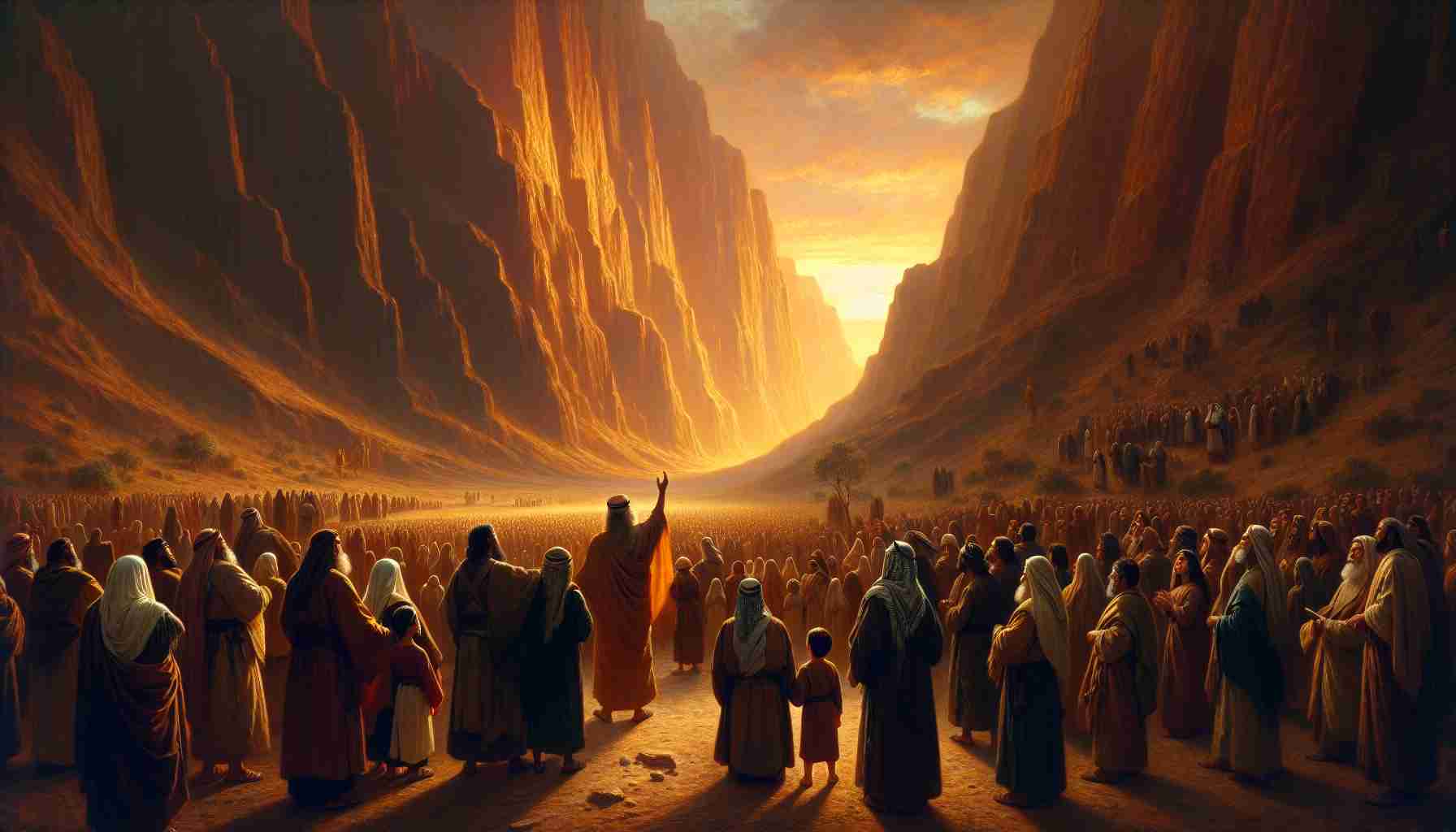

I was a tent-maker in the camp of Zebulun, known more for my worn hands than my voice. My name may not be in the scrolls, but I was there when Moses offered his final blessings before he left us.
The sun had barely risen when word came that Moses, our beloved leader, had climbed the hill for one last address. I left my tools behind and followed the crowd. My heart beat heavily—not just from the climb but from the weight of what I knew was coming. We had wandered for forty years, and now, with the land before us, Moses would not enter with us. That stung more than I expected.
I found a spot between a mother nursing her child and an old man leaning on a staff. Silence fell as Moses began. His voice, though aged, was steady—the same voice that had spoken to Pharaoh, had called down plagues, had brought the Torah down from Mount Sinai.
Moses blessed each tribe, one by one.
When he came to Zebulun—my tribe—he looked to the heavens, then to us.
“Rejoice, Zebulun, in your journeys,” he said, “and Issachar, in your tents. They shall summon peoples to the mountain; there they will offer righteous sacrifices, for they shall draw from the riches of the seas and treasures hidden in the sand.”
His words hit me like a stone. I always saw myself as ordinary. My hands knew ropes, wood, and hides. But Moses saw more. He spoke of our journeys, our trade routes, our tents of learning. Of calling nations together to worship God.
I suddenly remembered an evening when I was younger. My father had fastened a tent under a cloud of stars, and I’d complained—about the dryness of the land, my aching fingers, the wandering. He touched my shoulder and said, “One day, these paths will matter. God does not waste wandering.”
Now I understood what he meant.
Zebulun traveled while Issachar studied. Side by side, two tribes supporting one mission—bringing others closer to God. Moses wasn’t dividing us, but lifting us. Each blessing was not just a farewell—it was a charge, a purpose.
As he blessed the other tribes—Judah for strength, Levi for service, Benjamin for safety—I looked around. Faces glistened with tears. Not sadness alone, but something deeper—a realization. We were each part of a greater plan, written long before we crossed deserts or stared across the Jordan River.
Moses died not long after that day, on Mount Nebo. We mourned him deeply. But his blessings remained. They were not empty words—they were seeds planted in our hearts, meant to grow as we entered the land.
That day, I stopped seeing myself as just a tent-maker. I became a guardian of Zebulun’s calling: to journey, to gather, to bring holiness into each place my feet touched.
And from that moment, every stitch in my tents, every step I took, felt blessed.
I was a tent-maker in the camp of Zebulun, known more for my worn hands than my voice. My name may not be in the scrolls, but I was there when Moses offered his final blessings before he left us.
The sun had barely risen when word came that Moses, our beloved leader, had climbed the hill for one last address. I left my tools behind and followed the crowd. My heart beat heavily—not just from the climb but from the weight of what I knew was coming. We had wandered for forty years, and now, with the land before us, Moses would not enter with us. That stung more than I expected.
I found a spot between a mother nursing her child and an old man leaning on a staff. Silence fell as Moses began. His voice, though aged, was steady—the same voice that had spoken to Pharaoh, had called down plagues, had brought the Torah down from Mount Sinai.
Moses blessed each tribe, one by one.
When he came to Zebulun—my tribe—he looked to the heavens, then to us.
“Rejoice, Zebulun, in your journeys,” he said, “and Issachar, in your tents. They shall summon peoples to the mountain; there they will offer righteous sacrifices, for they shall draw from the riches of the seas and treasures hidden in the sand.”
His words hit me like a stone. I always saw myself as ordinary. My hands knew ropes, wood, and hides. But Moses saw more. He spoke of our journeys, our trade routes, our tents of learning. Of calling nations together to worship God.
I suddenly remembered an evening when I was younger. My father had fastened a tent under a cloud of stars, and I’d complained—about the dryness of the land, my aching fingers, the wandering. He touched my shoulder and said, “One day, these paths will matter. God does not waste wandering.”
Now I understood what he meant.
Zebulun traveled while Issachar studied. Side by side, two tribes supporting one mission—bringing others closer to God. Moses wasn’t dividing us, but lifting us. Each blessing was not just a farewell—it was a charge, a purpose.
As he blessed the other tribes—Judah for strength, Levi for service, Benjamin for safety—I looked around. Faces glistened with tears. Not sadness alone, but something deeper—a realization. We were each part of a greater plan, written long before we crossed deserts or stared across the Jordan River.
Moses died not long after that day, on Mount Nebo. We mourned him deeply. But his blessings remained. They were not empty words—they were seeds planted in our hearts, meant to grow as we entered the land.
That day, I stopped seeing myself as just a tent-maker. I became a guardian of Zebulun’s calling: to journey, to gather, to bring holiness into each place my feet touched.
And from that moment, every stitch in my tents, every step I took, felt blessed.